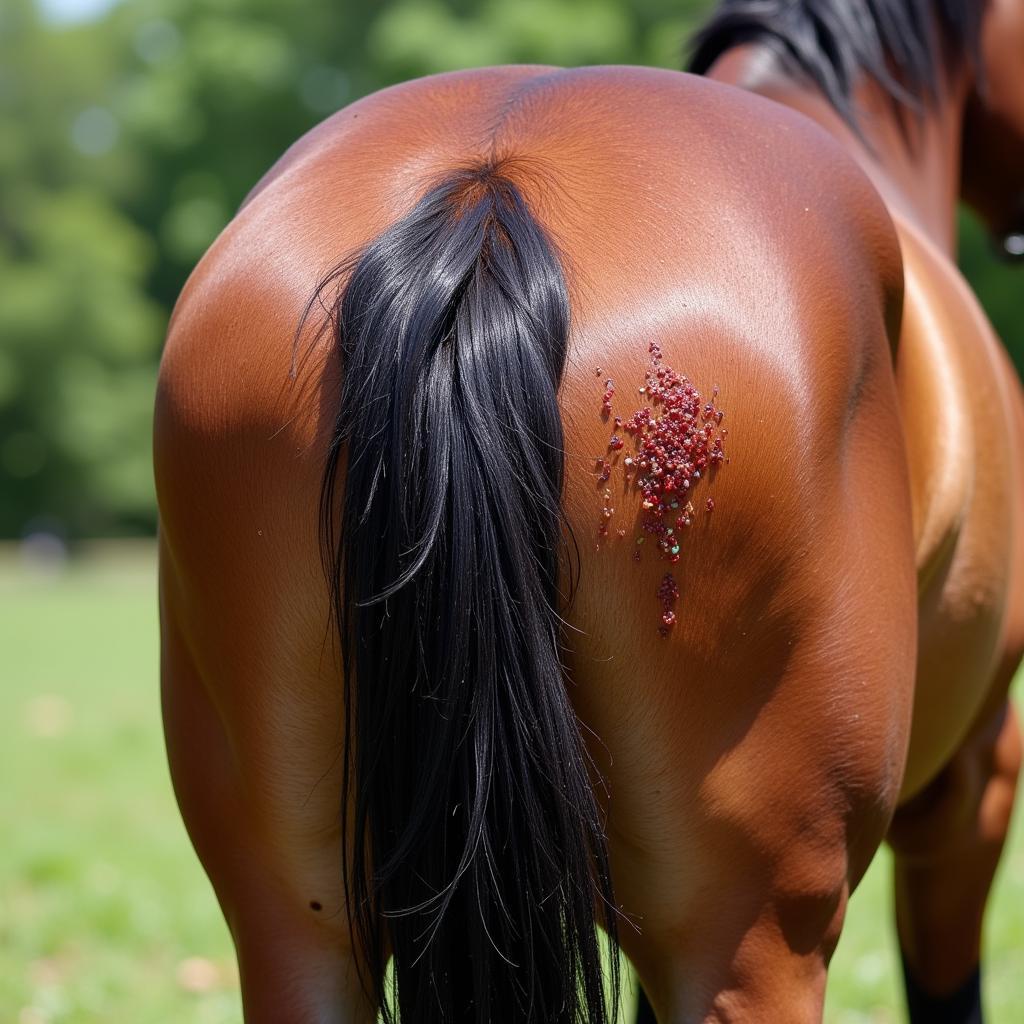If your horse has an itchy tail, you know the struggle. Constant swishing, rubbing, and even biting can lead to hair loss and skin irritation. Understanding the reasons behind this irritating behavior is the first step to finding a solution and providing relief for your equine friend.
Why Does My Horse Have an Itchy Tail?
Several factors can contribute to an itchy tail in horses. Pinpointing the exact cause is crucial for effective treatment. Common culprits include:
- External Parasites: These tiny pests are a frequent cause of itching. Mites, lice, and ticks can infest the tail area, causing intense irritation.
- Sweet Itch: This allergic reaction to the bites of Culicoides midges (no-see-ums) often affects the mane and tail, leading to relentless itching and rubbing.
- Ringworm: This fungal infection can cause circular, scaly patches on the skin, including the tail area, resulting in itching and hair loss.
- Dry Skin: Especially prevalent during dry weather, dry skin can become itchy and flaky, affecting the tail and other areas of the body.
- Allergies: Horses can develop allergies to various substances, including certain plants, insects, or even grooming products. These allergies can manifest as itchy skin, particularly in sensitive areas like the tail.
- Poor Hygiene: A dirty tail can trap dirt, sweat, and other irritants, leading to itching and discomfort.
 Horse Itchy Tail from Parasites
Horse Itchy Tail from Parasites
Identifying the Cause of Your Horse’s Itchy Tail
Diagnosing the specific cause of your horse’s itchy tail might require a veterinarian’s expertise. A thorough examination, skin scrapings, or blood tests can help determine the underlying issue.
Effective Treatments for an Itchy Tail
Once you’ve identified the culprit, you can implement the appropriate treatment. Here are some common approaches:
- Parasite Control: Regularly applying fly sprays, dewormers, and other parasite control products can help prevent and eliminate infestations. If your horse has sweet itch, consider using a fly sheet and mask for added protection.
- Antifungal Medications: If ringworm is the culprit, your veterinarian may prescribe antifungal shampoos, creams, or oral medications.
- Moisturizing Shampoos and Conditioners: For dry skin, using a horse shampoo and conditioner can help soothe and hydrate the skin, reducing itching. A best horse shampoo and conditioner will nourish the skin.
- Allergy Management: Identify and eliminate any potential allergens from your horse’s environment. Your veterinarian may recommend allergy testing to pinpoint specific triggers. Antihistamines or corticosteroids may be prescribed to manage allergic reactions.
 Horse Tail Treatment with Medicated Shampoo
Horse Tail Treatment with Medicated Shampoo
Preventing an Itchy Tail in Horses
Prevention is always better than cure. Here are some proactive measures to keep your horse’s tail itch-free:
- Regular Grooming: Grooming your horse’s tail regularly helps remove dirt, debris, and parasites, preventing irritation.
- Proper Hygiene: Ensure your horse’s stall is clean and dry. Regularly clean water troughs and feed buckets.
- Balanced Diet: Providing a balanced diet with essential nutrients supports healthy skin and coat, reducing the risk of dry skin and other issues. Consider camellia oil for horses as a supplement.
- Fly Control: Implementing effective fly control measures can significantly reduce the risk of insect-related itching.
What if My Horse is Still Itchy?
“If your horse continues to experience itching despite treatment, it’s essential to consult your veterinarian again,” advises Dr. Emily Carter, DVM, specializing in equine dermatology. “Underlying health conditions could be contributing to the problem.”
Conclusion
A Horse Has Itchy Tail can be a sign of various underlying issues. By carefully observing your horse, identifying the cause, and implementing appropriate treatment and preventative measures, you can help your equine companion find relief from this irritating problem. Remember, early intervention is key to preventing further complications. Consider horse oil conditioner for ongoing tail health. If the itching persists, consult your veterinarian for a thorough evaluation.
FAQ
- Can an itchy tail be a sign of a serious problem? Yes, it can sometimes indicate an underlying health issue.
- What are the most common causes of an itchy tail? Parasites, sweet itch, and dry skin are common culprits.
- Should I use human shampoo on my horse’s tail? No, use equine-specific products.
- How often should I groom my horse’s tail? Regularly, ideally several times a week.
- Can diet affect tail health? Yes, a balanced diet is essential for healthy skin and coat. Does flaxseed make horses hot? This might be a concern if your horse’s itching is worsened by heat.
- When should I call the vet? If the itching persists or worsens despite treatment.
- Can an itchy tail be contagious to other horses? Some causes, like ringworm, can be contagious.
Need help? Contact us! Phone: 0772127271, Email: [email protected] or visit us at QGM2+WX2, Vị Trung, Vị Thuỷ, Hậu Giang, Việt Nam. Our customer service team is available 24/7.